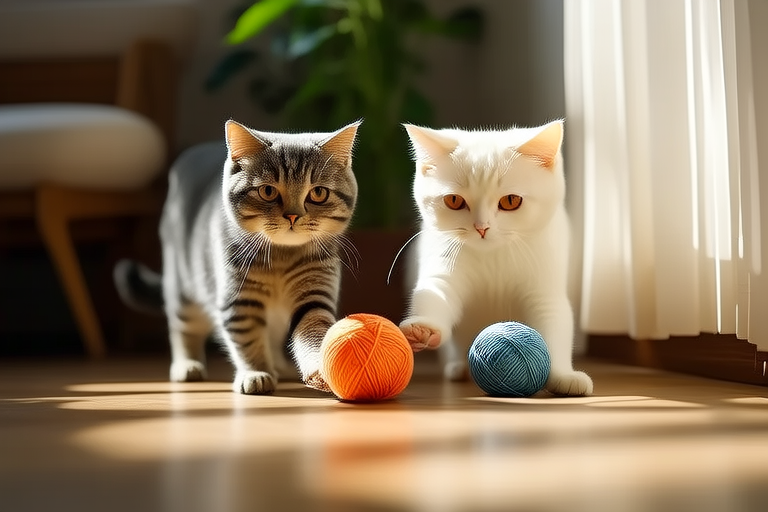Adorable Munchkins: The Cats With Stilts
Welcome to the world of Munchkin cats, a breed known for its endearing nickname – “the cats with stilts.” These felines are renowned for their unusually short legs, a genetic quirk that has made them a subject of curiosity and admiration among cat enthusiasts. The story behind their distinctive trait is as fascinating as the cats themselves.
The Genetic Marvel Behind Short Legs
The Munchkin cat’s short legs are the result of a spontaneous genetic mutation that occurred in the 1980s in Louisiana. This mutation was passed down through generations, eventually leading to the establishment of the Munchkin breed. Unlike some other breeds, Munchkins do not suffer from dwarfism but instead exhibit a condition known as achondroplasia, which results in proportionately shorter legs while retaining a normal-sized torso and head.
Initially, the Munchkin cat faced controversy within the feline community. Some critics argued that the short-legged trait could lead to health issues. However, over time, careful breeding and thorough veterinary assessments have demonstrated that Munchkins can lead healthy, active lives, much like any other domestic cat.
A Playful and Affectionate Companion
Munchkin cats are often described as having a personality that matches their diminutive stature – they are charming, playful, and incredibly affectionate. Their short legs don’t hinder their ability to explore their surroundings; instead, they make the most of every opportunity to engage with their environment. Whether it’s chasing after toys, climbing onto furniture, or simply lounging in a cozy spot, Munchkins are always ready for adventure.
Contrary to popular belief, Munchkins are not less agile than their long-legged counterparts. While their legs may be shorter, they compensate with incredible flexibility and balance. Studies have shown that Munchkins can jump just as high as other cats, thanks to their strong back legs and flexible spines. They also possess a unique ability to navigate tight spaces and leap onto elevated surfaces with surprising ease.
One anecdote that highlights their adaptability comes from a shelter worker who observed a Munchkin cat navigating a narrow shelf filled with toys. Despite its short legs, the cat managed to balance and reach the far end of the shelf with remarkable grace. This incident underscores the breed’s resilience and resourcefulness.
Misconceptions About Agility and Health
Despite their playful nature, there are some misconceptions about Munchkin cats’ agility and health. One common myth is that their short legs make them less capable of running or playing. In reality, Munchkins are quite athletic and enjoy games that involve speed and agility. Another misconception is that they are prone to back problems or other health issues due to their unique physique. While it’s true that Munchkins require gentle handling, proper care and a balanced diet can help prevent any potential health concerns.
Research conducted by veterinary professionals has shown that Munchkins can live long, healthy lives when given the right care. Regular check-ups, a nutritious diet, and a safe living environment are key factors in ensuring their well-being. It’s important for owners to be aware of their cat’s specific needs and provide appropriate support.
Tips for Potential Owners
If you’re considering adopting a Munchkin cat, here are some essential tips to ensure your new furry friend thrives:
- Gentle Handling: Due to their shorter legs, Munchkin cats benefit from gentle handling. When picking up your Munchkin, support both the front and back of their body to avoid putting undue strain on their spine.
- Safe Environment: Create a space where your Munchkin can move around freely without risking injury. Remove any sharp edges or small objects that could cause harm. Providing sturdy, low-rise furniture can help your cat feel secure and comfortable.
- Nutritious Diet: A balanced diet rich in proteins and essential nutrients is crucial for maintaining your Munchkin’s health. Consult with your veterinarian to determine the best food options for your cat’s age and activity level.
- Regular Exercise: Encourage your Munchkin to stay active by providing interactive toys and playtime. Mental stimulation is equally important, so consider puzzle feeders or treat-dispensing toys to keep your cat engaged.
- Veterinary Care: Schedule regular visits to the vet to monitor your Munchkin’s health and address any concerns early on. Discuss any specific needs related to their unique physique with your veterinarian.
By following these guidelines, you can ensure that your Munchkin cat enjoys a happy, healthy life. Remember, each Munchkin is a unique individual with its own personality and quirks. Spend time getting to know your cat, and you’ll be rewarded with a lifetime of companionship and joy.
Conclusion
Munchkin cats are more than just a novelty; they are loving, playful companions that bring endless delight to their families. Their short legs might seem like a limitation, but in reality, they are a testament to the adaptability and resilience of these special cats. By understanding their unique needs and providing them with the care they deserve, you can ensure that your Munchkin cat leads a fulfilling, healthy life. Whether you’re an experienced cat owner or a first-time pet parent, a Munchkin cat can be a wonderful addition to your home. So why not open your heart and home to one of these adorable “cats with stilts”? Your life will never be the same again.
